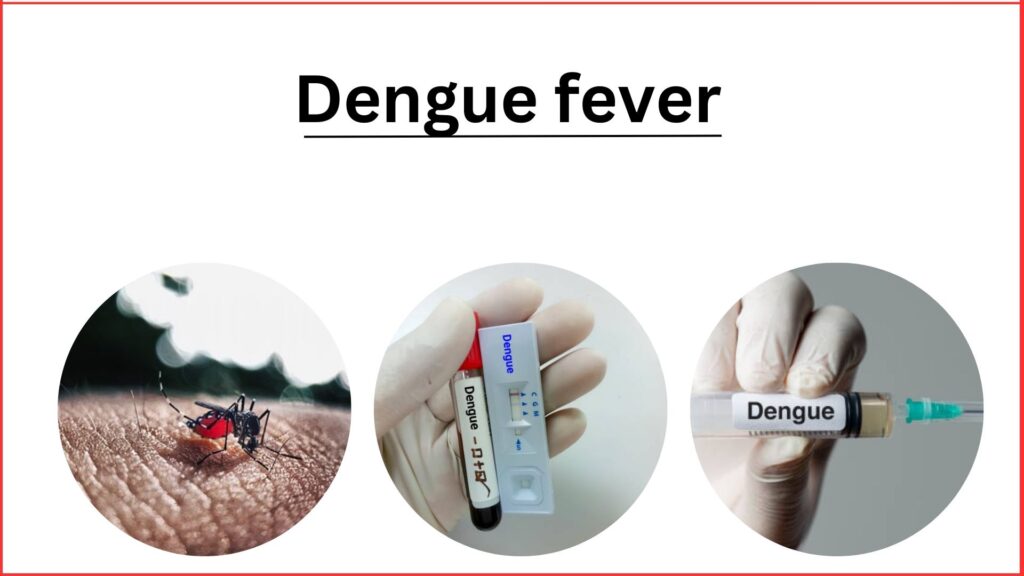Dengue fever : Symptoms, Causes, treatment & prevention
Dengue Fever
We have described in article :
Causes of viral haemorrhagic fever
Symptoms of dengue fever
Warning signs of dengue fever
Treatment of dengue fever
Criteria of severe dengue fever
Complications of dengue fever
Prevention of dengue fever
Criteria of severe dengue fever

Causes of viral haemorrhagic fever :
- Dengue
- Yellow fever
- Lassa fever
- Ebola fever
- Marburg fever
- Crimean-Congo haemorrhagic fever.
- Rift Valley fever.
- Kyasanur fever
- Bolivian and Argentinian haemorrhagic fever
- Hantan fever (haemorrhagic fever with renal syndrome).
Case of Definition of dengue fever :
Define : Dengue fever is an acute febrile illness of 2-7 days duration sometimes with two peaks having the following manifestations
- Sudden onset continuous fever. And
- Two or more of the following features
- Retro orbital pain severe myalgia / arthralgia/back pain.
- Severe headache
- Hemorrhagic manifestation.
- Nausea/vomiting/abdominal pain.
- Rash
Causative organism of dengue fever :
Dengue virus, which is a flavi virus. It has 4 serotypes.
Vector :
- Aedes aegypti.
- Aedes albopictus.
Types/manifestations of dengue infection :
- Asymptomatic infection
- Symptomatic infection :
- Undifferentiated fever (viral syndrome).
- Classical dengue fever.
- Dengue haemorrhagic fever
- Expanded dengue syndrome.
Symptoms of dengue fever :
- Fever :
- Three is sharp rise of temperature frequently associated with flushed face and headache.
- Temperature usually between 39° C to 40° C.
- Lasting 2-7 days is most cases.
2. Rash:
- First 2 3 days – diffuse flushing or fleeting eruption may be seen in face, neck and chest
- 3rd and 4th day a conspicuous rash that may be maculopapular or rubelliform.
- Afebrile period or defervescence – Petechiae surrounding scattered pale, round areas of normal skin may appear over the dorsum of the feet, on the legs and on the hands and arms.
3. Other feature :
- Retro-orbital pain on eye movement or eye pressure.
- Photophobia.
- Backache and pain in the muscles and joints/bone.
- Anorexia and altered taste sensation, constipation, colicky abdominal pain and abdominal tenderness.
Investigations of dengue fever :
- Complete blood count: Leukopenia & thrombocytopenia.
- ELISA to detect NSI antigen
- Antibody titre : Four-fold rise in IgG titre
- Isolation of dengue virus from blood.
- Detection of dengue virus RNA by PCR.
Treatment of dengue fever :
- Symptomatic treatment.
- Aspirin should be avoided due to bleeding risk.
- Volume replacement and blood transfusions may be indicated in patients with shock.
- Corticosteroids have not been shown to help.
- No existing antivirals are effective.
Management of dengue shock syndrome :
- Immediate volume replacement by crystalloid solution (10-20 ml/kg/h for 1-2 hour).
- If improved, then reduction of crystalloid 20 to 10, to 6, to 3 ml/kg/h and maintain the I/V therapy: for 24-48 hour.
- If no improvement, then immediate oxygen inhalation and do the hematocrit level.
- If hematocrit rises, I/V colloid infusion, if improves then I/V crystalloid solution continued for 24-48 hour.
- If hematocrit decrease, blood transfusion and if improves then crystalloid infusion should be continued up to 24-48 hour.
Case definition of dengue shock syndrome :
Dengue shock syndrome is a presentation of dengue syndrome when a case of dengue manifests circulatory failure with one or more of following features :
- Hypotension for age.
- Cold clammy skin, restless, rapid weak pulse.
- Narrow pulse pressure.
- Profound shock.
Prevention of dengue fever :
- Breeding places of Aedes mosquitoes should be abolished.
- Adult mosquitoes are destroyed by insecticides.
- There is no licensed vaccine available.
Criteria of severe dengue fever :
1.. Severe plasma leakage leading to :
- Shock (dengue shock syndrome).
- Fluid accumulation with respiratory distress.
2. Severe haemorrhagic manifestations, e.g. GI haemorrhage.
3. Severe organ involvement :
- Liver AST or ALT 21000 U/L
- CNS : inpaired consciousness, meningoencephalitis, seizures.
- Cardiomyopathy, conduction defects, arryhythmias.
- Other organs, e.g, acute kidney injury, pancreatitis, acute lung injury, disseminated intravascular coagulopathy, rhabdomyolysis.
Complications of dengue fever :
- Dengue haemorrhagic fever and dissiminated intravascular coagulation.
- Dengue shock syndrome.
- Severe organ involvement : hepatitis, cerebral haemorrhage or oedema, encephalitis, cranial nerve palsy, rhabdomyolysis, myocarditis.
Indications for hospital admission :
- Very weak, poor appetite or severe dehydration.
- Presence of warning signs
- Significant bleeding
- WBC 5000 cell/mm’ in high risk group (Infants, elderly, pregnancy, prolonged shock, significant bleeding, underlying disease, neurological manifestations).
- Platelet count 100000 cell/mm and presence of weakness, poor appetite.
- Rising het 10-20%
- No clinical improvement and weakness when no fever
- Less urine in 4-6 hours.
- Extreme family anxiety
- Shock or impending shock-
- No fever but rapid pulse
- Capillary refill
- Cold, clammy extremities, skin motling.
- Imitable, restless, confusion
- Pulse pressure 20 mmhg.
- Fainting postural hypotension.

I enjoy your piece of work, appreciate it for all the informative content.